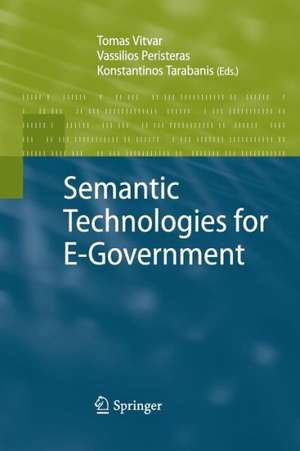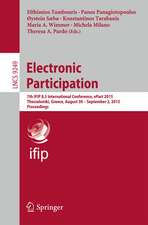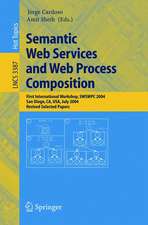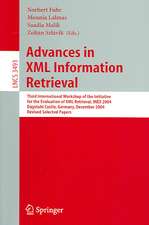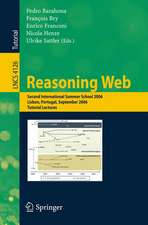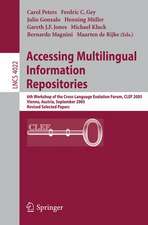Semantic Technologies for E-Government
Editat de Tomas Vitvar, Vassilios Peristeras, Konstantinos Tarabanisen Limba Engleză Paperback – 31 oct 2014
With this book, the editors present the latest research results on how to use semantic technologies in order to improve or even revolutionize the use of ICT in public administration systems. The contributions are organized into three parts: architectures and process integration, ontologies and interoperability, and portals and user interactions. They give a broad overview of how semantic technologies have been applied in different e-government projects funded from the European program for ICT Research and Development, and they cover a wide spectrum of semantic technologies such as development of domain and service ontologies, semantic enhancements of business process models, semantic Service-Oriented Architectures (SOAs) based on Semantic Web Services (SWS) frameworks, and ontology-based knowledge management.
In this volume, researchers of Semantic Web technologies will find a wealth of challenging real-world scenarios to stimulate new fields of research, while developers of e-government systems as well as other stakeholders in public administration will appreciate the detailed presentations and discussions of numerous applications in areas such as e-government portals, personalization of Web-based public services, or integration and orchestration of public administration processes.
| Toate formatele și edițiile | Preț | Express |
|---|---|---|
| Paperback (1) | 641.97 lei 6-8 săpt. | |
| Springer Berlin, Heidelberg – 31 oct 2014 | 641.97 lei 6-8 săpt. | |
| Hardback (1) | 654.05 lei 6-8 săpt. | |
| Springer Berlin, Heidelberg – 17 feb 2010 | 654.05 lei 6-8 săpt. |
Preț: 641.97 lei
Preț vechi: 802.46 lei
-20% Nou
Puncte Express: 963
Preț estimativ în valută:
122.86€ • 126.75$ • 103.98£
122.86€ • 126.75$ • 103.98£
Carte tipărită la comandă
Livrare economică 05-19 martie
Preluare comenzi: 021 569.72.76
Specificații
ISBN-13: 9783642424335
ISBN-10: 3642424333
Pagini: 340
Ilustrații: XVI, 321 p.
Dimensiuni: 155 x 235 x 18 mm
Greutate: 0.48 kg
Ediția:2010
Editura: Springer Berlin, Heidelberg
Colecția Springer
Locul publicării:Berlin, Heidelberg, Germany
ISBN-10: 3642424333
Pagini: 340
Ilustrații: XVI, 321 p.
Dimensiuni: 155 x 235 x 18 mm
Greutate: 0.48 kg
Ediția:2010
Editura: Springer Berlin, Heidelberg
Colecția Springer
Locul publicării:Berlin, Heidelberg, Germany
Public țintă
ResearchCuprins
Architectures and Process Integration.- Semantic Technologies for E-Government: An Overview.- Pan-European E-Government Services Architecture.- Employing Semantic Technologies for the Orchestration of Government Services.- The Modelling of Knowledge-Intensive Processes Using Semantics.- E-Government Goes Semantic Web: How Administrations Can Transform Their Information Processes.- ONTOLOGIES AND INTEROPERABILITY.- A Semantic Cooperation and Interoperability Platform for the European Chambers of Commerce.- SEEMP: A Networked Marketplace for Employment Services.- Semantic Repositories for eGovernment Initiatives: Integrating Knowledge and Services.- Toward an E-Government Semantic Platform.- PORTALS AND USER INTERACTION.- Semantic-Based Knowledge Management in E-Government: Modeling Attention for Proactive Information Delivery.- Personalization in E-Government: An Approach that Combines Semantics and Web 2.0.- A Semantically Enabled Portal for Facilitating the Public Service Provision.
Recenzii
From the reviews:
“As more and more of the world becomes Web based, special challenges have emerged in implementing e-government applications, especially applying Web 2.0 and related technologies. To help meet this challenge, the European Union (EU) has funded numerous research efforts. This collection of essays describes … results of these research projects. … All of the papers are clear and well written. … an excellent volume that will surely be a very valuable resource for anyone involved in this type of project.” (M. D. Derk, ACM Computing Reviews, August, 2010)
“As more and more of the world becomes Web based, special challenges have emerged in implementing e-government applications, especially applying Web 2.0 and related technologies. To help meet this challenge, the European Union (EU) has funded numerous research efforts. This collection of essays describes … results of these research projects. … All of the papers are clear and well written. … an excellent volume that will surely be a very valuable resource for anyone involved in this type of project.” (M. D. Derk, ACM Computing Reviews, August, 2010)
Notă biografică
Dr. Tomas Vitvar is a senior researcher with the Distributed and Parallel Systems group at the University of Innsbruck in Austria. He has over ten years of industrial and research experience gained while working as a software developer, IT architect, systems analyst, researcher and a lecturer. His professional interests are in distributed systems and applications including service-oriented computing, web services and enterprise computing.
Dr. Vassilios Peristeras is a research fellow and adjunct lecturer in the Digital Enterprise Research Institute at the National University of Ireland, Galway. His research interests include eGovernment and e-participation, collaborative work environments, social software, and the Semantic Web.
Dr. Konstantinos A. Tarabanis is a professor at the Department of Business Administration of the University of Macedonia, Greece. He was Research Staff Member at the IBM T.J. Watson Research Center where he worked on e-manufacturing techniques. His current research interests include conceptual modeling of information systems, service models and architectures, as well as the domains of e-government, e-learning, e-participation and e-business. He has received best paper awards from the European Conference on Information Systems for his work in e-government and from the International Academy of e-business for his work in e-business.
Dr. Vassilios Peristeras is a research fellow and adjunct lecturer in the Digital Enterprise Research Institute at the National University of Ireland, Galway. His research interests include eGovernment and e-participation, collaborative work environments, social software, and the Semantic Web.
Dr. Konstantinos A. Tarabanis is a professor at the Department of Business Administration of the University of Macedonia, Greece. He was Research Staff Member at the IBM T.J. Watson Research Center where he worked on e-manufacturing techniques. His current research interests include conceptual modeling of information systems, service models and architectures, as well as the domains of e-government, e-learning, e-participation and e-business. He has received best paper awards from the European Conference on Information Systems for his work in e-government and from the International Academy of e-business for his work in e-business.
Textul de pe ultima copertă
E-government faces huge challenges in achieving interoperability and integration, taking into account differences in laws, regulations, services, administrative processes and languages across regions and countries. On the other hand, issues like service, data and process´integration have been researched by the Semantic Web community for several years now, and in the last two to three years we have witnessed the first applications of semantic technologies in real, operational e-government systems in both Europe and the US which address exactly these challenges.
With this book, the editors present the latest research results on how to use semantic technologies in order to improve or even revolutionize the use of ICT in public administration systems. The contributions are organized into three parts: architectures and process integration, ontologies and interoperability, and portals and user interactions. They give a broad overview of how semantic technologies have been applied in different e-government projects funded from the European program for ICT Research and Development, and they cover a wide spectrum of semantic technologies such as development of domain and service ontologies, semantic enhancements of business process models, semantic Service-Oriented Architectures (SOAs) based on Semantic Web Services (SWS) frameworks, and ontology-based knowledge management.
In this volume, researchers of Semantic Web technologies will find a wealth of challenging real-world scenarios to stimulate new fields of research, while developers of e-government systems as well as other stakeholders in public administration will appreciate the detailed presentations and discussions of numerous applications in areas such as e-government portals, personalization of Web-based public services, or integration and orchestration of public administration processes.
With this book, the editors present the latest research results on how to use semantic technologies in order to improve or even revolutionize the use of ICT in public administration systems. The contributions are organized into three parts: architectures and process integration, ontologies and interoperability, and portals and user interactions. They give a broad overview of how semantic technologies have been applied in different e-government projects funded from the European program for ICT Research and Development, and they cover a wide spectrum of semantic technologies such as development of domain and service ontologies, semantic enhancements of business process models, semantic Service-Oriented Architectures (SOAs) based on Semantic Web Services (SWS) frameworks, and ontology-based knowledge management.
In this volume, researchers of Semantic Web technologies will find a wealth of challenging real-world scenarios to stimulate new fields of research, while developers of e-government systems as well as other stakeholders in public administration will appreciate the detailed presentations and discussions of numerous applications in areas such as e-government portals, personalization of Web-based public services, or integration and orchestration of public administration processes.
Caracteristici
Includes supplementary material: sn.pub/extras
